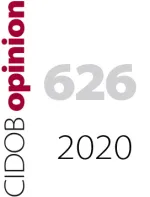The European Union as the centre of gravity of the economic and political strategies to end the crisis

The European Union remains the centre of gravity of the economic and political strategies to end the current economic crisis. The consequences of the pandemic on the German economy and on mobility within the Union, along with difficulties of poor countries around the continent are the three real risks that could plunge the European Union into an existential crisis.
This article was published in Le Monde on 23 May 2020
If the European Union does not change its policies, "it will not survive," Spanish Vice-President Pablo Iglesias told the Financial Times on 8th May. "It is really the whole European edifice that could be under pressure. … The whole [European] project is at stake," Paolo Gentiloni, European Commissioner for Economic and Monetary Affairs and former President of the Council in Italy, said on the same day, citing Emmanuel Macron's remarks. Some hindsight on the history of European integration suggests, however, that the three reasons often put forward to justify these predictions are unlikely. By contrast, three other problems, so far hardly taken into account, could in the medium term throw the European Union into a political crisis.
The first reason for an existential crisis in the European Union that is commonly put forward is that the health crisis would have heralded the return of the state as the central focus of politics, leading to a retreat into nations and a decline in international cooperation. However, far from seeing French, Italian or Spanish leaders embarking on national recovery plans, we have been seeing them calling for European "solidarity" with their eyes turned towards Brussels, Frankfurt and even Karlsruhe and Berlin. European integration is the product of international interdependence in Europe. Far from having abolished it, the health crisis has strengthened it. Even if states are in charge of public health measures to contain the pandemic, the European Union remains the centre of gravity of economic and political strategies to exit the crisis.
Secondly, it is also doubtful that the Union would be threatened by the structural inadequacy of solidarity mechanisms in the monetary union. European institutions are already providing decisive support. Some budget increase and a European stimulus plan are also possible. Yet, the theoretical case of an asymmetric shock necessarily leading to a radical expansion of the budget and the opening of a European debt to the service of individual Member States has not yet occurred and does not find much echo in the current recession.
The third reason commonly put forward is that territorial divides could prove fatal to the European Union. Actually, the Union’s main divide could disappear by the end of this decade. The disparities between the eastern and western parts of the continent have the most contributed to explaining the setbacks of European integration, from the rejection of the Constitutional Treaty in 2005 until Brexit. However, countries in the eastern part of the continent have so far been relatively little affected by the pandemic and are expected to continue to converge with the western part. Undeniably, a divide at the expense of Spain and Italy is emerging but is not comparable to the challenge created by the presence of eastern European countries in the Union.
Beyond these pretences, however, there are three points of uncertainty, from the centre to the neighbourhood of the Union, which could lead to a full-blown political crisis. In the centre, how will Germany emerge from the economic crisis? If there was some asymmetric shock, it might be to look for on that side. Germany certainly seems to be succeeding in managing the health crisis. Nevertheless, the German economy depends heavily on international trade, the automotive sector, and the production of machine tools and has been hit hard by a crisis that has caused trade, car sales, and capital expenditures to collapse. In the history of European integration, Germany has always provided the greater part of the economic and financial resources that have enabled this historic change. A crisis at the heart of the Union would be detrimental to its future. For now, however, the limited decline in the investment rate in Germany may presage an exit from the crisis.
A second uncertainty hangs over mobility within the Union in the context of the pandemic. Major migration flows from the south to the north of Europe had followed the previous economic crisis from 2008. By providing opportunities for workers from countries enmeshed in recession and unemployment, these movements had helped to mitigate the political impact of that crisis. Will such movements be able to happen again? Borders are closed for now and could remain closed if the epidemic resumes. Quarantine periods between European countries could also reduce mobility. In addition, the pandemic may have already affected the propensity for emigration, which is always risky, especially in times of health uncertainty. With this migration valve of economic and social security hampered, the coming crisis could be more politically violent than the previous one.
The third and final risk is around the Union. The main losers in this crisis will be the poor countries of the Sahel, North Africa, and parts of the Middle East. Legal migration opportunities to Europe, trade with Europe, and investment from Europe should dry up. The remittances of emigrants in Europe have already collapsed. The political consequences can be all the more serious since the conflicts that erupted or resumed a few years after the previous economic crisis are still active: in Libya, Syria and Iraq, as well as in the Sahel. The chaos in these regions can affect the European Union, for example in the form of waves of irregular migrants driven by despair.
As these three points of uncertainty depend on the intensity of the health crisis in Europe, strengthening the means to combat the pandemic remains the best way to overcome them.
Keywords: EU, pandemics, economy, Germany, European integration
E-ISSN: 2013-4428
D.L.: B-8439-2012